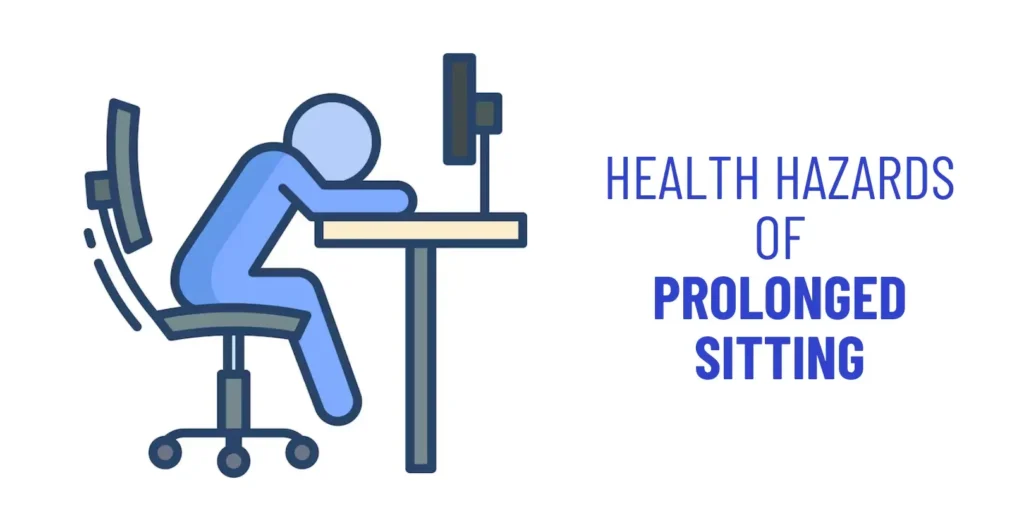Prolonged sitting or being inactive for extended periods can be extremely harmful to your health. Let’s delve into what doctors have to say about the adverse health effects of sitting all day.
Did you know that sitting for long periods without breaks can lead to high blood pressure and increase your risk of dying from heart disease? In fact, any extended sitting—whether at a desk, behind the wheel, or in front of a screen—can be harmful.
When we sit, we use less energy than when we stand or walk. Research has linked prolonged sitting to several health concerns, including obesity and a group of conditions such as high blood sugar, excess body fat around the waist, and abnormal cholesterol levels.
A cardiologist explains that many studies have been conducted to understand the relationship between sitting time and health risk factors. These studies found that people who sat for more than eight hours a day without physical activity faced similar risks. Thus, living a sedentary lifestyle can be dangerous to your health. The less you sit or lie down during the day, the better your chances of living a healthy life.
You Might Be at Risk for Health Problems Despite Regular Exercise
Do you think you’re active enough to keep health problems at bay? Does your routine include just 30 minutes of exercise and then sitting for the rest of the day? If so, you might want to rethink your approach.
A group of Finnish researchers recently coined the term “active couch potato” for people who exercise daily but then spend the rest of the day resting.
This means that, unfortunately, prolonged sitting can negate the benefits you gain during your workout session.
About the Study
The study, published in “Medicine & Science in Sports & Exercise,” involved over 3,700 men and women in Finland. They were asked to wear scientific-grade activity trackers for at least a week to assess their movements throughout the day.
It was found that those who exercised for 30 minutes daily but remained sedentary for 10 to 12 hours had higher levels of blood sugar, cholesterol, and body fat than those who moved around more. These individuals were termed active couch potatoes in the study.
In contrast, those who got up and moved around even a little were found to be healthier than active couch potatoes.
30 Minutes of Exercise a Day Is Not Enough
According to Vahid Farrahi, a postdoctoral scientist at the University of Oulu and the lead author of the new study, a half-hour workout session may not be “enough” to counteract the negative effects of prolonged sitting.
Raiha Korpelainen, a professor of health exercise at the University of Oulu in Finland and a co-author of the new study, told the Washington Post, “It’s only in the last five years or so that we’ve begun to understand that physical activity is not the whole story.”
Which Category Do You Fall Into?
At the end of the study, the researchers categorized people into four different groups depending on how much they moved throughout the day.
Among the participants, 1,173 were “active couch potatoes,” 1,199 were “sedentary light movers,” 694 were “sedentary exercisers,” and 636 were “movers.”
Both active couch potatoes and sedentary light movers exercised for 30 minutes daily but remained seated for the rest of the day. However, sedentary light movers were 40% more active than active couch potatoes.
Sedentary exercisers sat for long periods but dedicated an hour to daily exercise.
On the other hand, movers not only exercised for an hour but also engaged in an additional two hours of physical activity during their daily tasks.
After comparing all these groups, researchers found that active couch potatoes had the worst levels of blood sugar control, body fat percentage, and cholesterol.
How to Reduce Your Risk?
In addition to your exercise routine, engage in light movement, even if it means taking a short walk, brisk walking, or just cleaning your house. Take the stairs, walk around your hallways. According to the study, 80-90 minutes of light activity during the day is ideal. However, “any extra movement should be beneficial,” Farrahi said.
The bottom line is that you should sit less and move more. It’s now up to you to decide how you want to achieve this. Don’t stress yourself out, but try to keep your body as active as possible.



